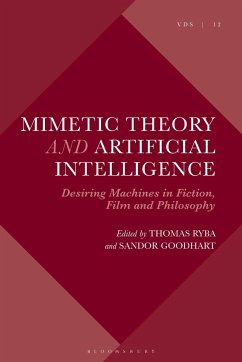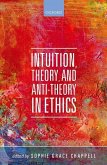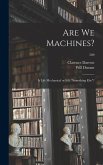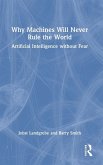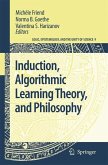Mimetic Theory, Ai, and Desiring Machines
Explorations in Technology, Film, Fiction, and Philosophy
Herausgeber: Ryba, Thomas; Hodge, Joel; Fleming, Chris; Goodhart, Sandor; Cowdell, Scott
206,99 €
inkl. MwSt.
Versandkostenfrei*
Erscheint vorauss. 18. September 2025
Melden Sie sich
hier
hier
für den Produktalarm an, um über die Verfügbarkeit des Produkts informiert zu werden.

103 °P sammeln
Mimetic Theory, Ai, and Desiring Machines
Explorations in Technology, Film, Fiction, and Philosophy
Herausgeber: Ryba, Thomas; Hodge, Joel; Fleming, Chris; Goodhart, Sandor; Cowdell, Scott
- Gebundenes Buch
As artificial intelligence assumes increasing prominence in our lives, a host of questions arise, particularly if one holds a view of humans as inherently social or mimetic, such as René Girard. Does the potential for self-awareness in artificial intelligence come with mimetic desire in the way Girard claims it does for human beings? Thomas Ryba and Sandor Goodhart bring together a team of renowned scholars to theorize artificial intelligence from a Girardian perspective for the first time. Chapters present cutting edge reflections on Girard's mimetic theory in connection with science, humans,…mehr
Andere Kunden interessierten sich auch für
![Intuition, Theory, and Anti-Theory in Ethics Intuition, Theory, and Anti-Theory in Ethics]() Sophie Grace ChappellIntuition, Theory, and Anti-Theory in Ethics115,99 €
Sophie Grace ChappellIntuition, Theory, and Anti-Theory in Ethics115,99 €![101 Ethical Dilemmas 101 Ethical Dilemmas]() Martin Cohen101 Ethical Dilemmas143,99 €
Martin Cohen101 Ethical Dilemmas143,99 €![Are We Machines? Are We Machines?]() Clarence DarrowAre We Machines?33,99 €
Clarence DarrowAre We Machines?33,99 €![Why Machines Will Never Rule the World Why Machines Will Never Rule the World]() Jobst LandgrebeWhy Machines Will Never Rule the World205,99 €
Jobst LandgrebeWhy Machines Will Never Rule the World205,99 €![Induction, Algorithmic Learning Theory, and Philosophy Induction, Algorithmic Learning Theory, and Philosophy]() Induction, Algorithmic Learning Theory, and Philosophy121,99 €
Induction, Algorithmic Learning Theory, and Philosophy121,99 €![Oliver Wendell Holmes, Jr., Legal Theory, and Judicial Restraint Oliver Wendell Holmes, Jr., Legal Theory, and Judicial Restraint]() Frederic R. KelloggOliver Wendell Holmes, Jr., Legal Theory, and Judicial Restraint107,99 €
Frederic R. KelloggOliver Wendell Holmes, Jr., Legal Theory, and Judicial Restraint107,99 €![Cognitive Science Cognitive Science]() Daniel KolakCognitive Science202,99 €
Daniel KolakCognitive Science202,99 €-
-
-
As artificial intelligence assumes increasing prominence in our lives, a host of questions arise, particularly if one holds a view of humans as inherently social or mimetic, such as René Girard. Does the potential for self-awareness in artificial intelligence come with mimetic desire in the way Girard claims it does for human beings? Thomas Ryba and Sandor Goodhart bring together a team of renowned scholars to theorize artificial intelligence from a Girardian perspective for the first time. Chapters present cutting edge reflections on Girard's mimetic theory in connection with science, humans, fiction, film, philosophy and God, shedding light on artificial intelligence and the consequences of the implementation of humanoid robots into daily life. In Part I, each argument is followed by a response, spanning topics from the philosophic foundations of mimetic theory and cognitive science through to scapegoating, mimesis, and the human future. Drawing on close interpretative readings of films, including A.I. Artificial Intelligence, Ex Machina and HER, as well as literary productions, philosophic essays and theological concepts, it offers a novel approach to utilize the seminal ideas of Girard. Setting out new challenges and insights, this interdisciplinary volume is an essential starting point for students and scholars of Girard, mimetic theory, artificial intelligence, robotics, film, philosophy of religion and ethics.
Hinweis: Dieser Artikel kann nur an eine deutsche Lieferadresse ausgeliefert werden.
Hinweis: Dieser Artikel kann nur an eine deutsche Lieferadresse ausgeliefert werden.
Produktdetails
- Produktdetails
- Verlag: Bloomsbury Academic
- Seitenzahl: 416
- Erscheinungstermin: 18. September 2025
- Englisch
- Abmessung: 234mm x 156mm x 25mm
- Gewicht: 454g
- ISBN-13: 9781350382732
- ISBN-10: 1350382736
- Artikelnr.: 69724765
- Herstellerkennzeichnung
- Libri GmbH
- Europaallee 1
- 36244 Bad Hersfeld
- gpsr@libri.de
- Verlag: Bloomsbury Academic
- Seitenzahl: 416
- Erscheinungstermin: 18. September 2025
- Englisch
- Abmessung: 234mm x 156mm x 25mm
- Gewicht: 454g
- ISBN-13: 9781350382732
- ISBN-10: 1350382736
- Artikelnr.: 69724765
- Herstellerkennzeichnung
- Libri GmbH
- Europaallee 1
- 36244 Bad Hersfeld
- gpsr@libri.de
Sandor Goodhart is Professor of English and Jewish Studies and former Director of the Religious Studies Program at Purdue University, USA. He is the former President of the Colloquium on Violence and Religion. Thomas Ryba is Director of Religious Studies at Purdue University, USA. He is the former Notre Dame Theologian in Residence at the St. Thomas Aquinas Center and Continuing Lecturer in Philosophy and Religious Studies at Purdue University.
Introduction An Introduction to this Volume
Sandor Goodhart and Thomas Ryba (both Purdue University
USA) AI
René Girard
and Philosophic Anthropology
Sorin Adam Matei (Purdue University
USA) Reflections on René Girard and AI
Martha Girard (USA) Part I: Thinking Through René Girard and AI 1. The Philosophic Foundations of Mimetic Theory and Cognitive Science (Including Artificial Intelligence)
Jean-Pierre Dupuy (Polytechnic University Paris
France) 2. A Response to Jean-Pierre Dupuy
Andrew McKenna (Loyola University
USA) 3. Mimetic Theory and AI
Lefteri Tsoukalas (Purdue University
USA) 4. A Response to Lefteri Tsoukalas
Mark Anspach (Imitatio
Inc.) 5. Desiring Machines: Machines That Are Desired and Machines That Desire
Paul Dumouchel (University of Québec
Canada) 6. A Response to Paul Dumouchel
William Johnsen (Michigan State University
USA) 7. Autonomous Robots: The Model / Rival of the Unhuman
Pablo Bandera (Honeybee Robotics) 8. A Response to Pablo Bandera
Jeremiah Alberg (International Christian University
Tokyo
Japan) 9. Taming the Desire of Sentient Machines with the Golden Rule
Sorin Adam Matei (Purdue University
USA) 10. A Response to Sorin Adam Matei
Rebecca Gibson (Indiana University
USA) 11. The Desire to Be like God: Addressing Temptations Coming Along with AI
Wolfgang Palaver (University of Innsbruck
Austria) 12. A Response to Wolfgang Palaver
Martha Reineke (University of Northern Iowa
USA) 13. The Destinies of Desire and Versions of the Virtual: Structures
Machines
and Desiring Machines
Arkady Plotnitsky (Purdue University
USA) 14. A Response to Arkady Plotnitsky
Nidesh Lawtoo (KU Leuven
Belgium) 15. Biological
Anthropological
and Algorithmic Mimesis
Eric Gans (University of California
Los Angeles
USA) 16. A Response to Eric Gans
Chris Fleming (University of Western Sydney
Australia) 17. Scapegoating
Mimesis
and the Human Future: Thinking with René Girard and Bernard Stiegler on the Automation of Desire
Johann Rossouw (University of the Free State
Bloemfontein
South Africa) 18. A Response to Johann Rossouw
Joachim Duyndam (University of Humanistic Studies
Utrecht
the Netherlands) Part II: René Girard and AI in Detail René Girard
Science
and AI 19. Girard Does Not Compute: A Girardian Criticism of AI
Dominic Pigneri (Catholic University of America
USA) 20. The AI Programmability of Mimetic Theory
Georgios Stathis (Leiden University
the Netherlands) 21. 'Dialogue' Robots and Machine 'Learning': The Mimetic Trap of Wishful Thinking
Thomas and Miriam Stuke (University of Basel
Switzerland) 22. Posthuman Mimesis: Unconscious Violence in Hypermimetic Games
Nidesh Lawtoo (KU Leuven
Belgium) René Girard
the Human
and AI 23. Awkward AI: Minor Resentments and Vertical Transcendence in Human-Robot Interactions
Benjamin Barber (United International College: Hong Kong Baptist-Beijing Normal University
China) 24. "Mimetic Theory
AI
and Police Systems"
Carlos Mora Benavides (Pontifical Javeriana University Portal
Colombia) 25. Nature and Artifice: Pressing (the) Disanalogies between Human Action and Robot Activity
Grant Poettecker (Briar Crest College and Seminary
Canada) 26. Robot Love: AI and the Future of Human Intimacy
Martha Reineke (University of Northern Iowa
USA) René Girard
Fiction
Film
and AI 27. Robots
AI
& Me. Some Considerations on AI and Robots as New Myths Telling Very Old Stories
David Garcia-Ramos (Catholic University of Valencia
Spain) 28. Artificial Intelligence and Literary Intelligence
Curtis Gruenler (Hope College
USA) 29. Desiring Machines and Doubles in Contemporary Fiction and Film
Matthew Packer (Buena Vista University
USA) 30. Artificial Intelligence and Mimetic Bondage in Spike Jonze's Her
Susan Wright (Theology and Peace) René Girard
Philosophy
and AI 31. The Mimetic Horizons of Time and Desire: A Phenomenological and SCI-FI Approach
Tania Checchi (College of Knowledge
Mexico) 32. Nonviolent Cognition of God with Artificial Intelligence in Computational Metaphysics
Christopher Morrissey (Trinity Western University
Canada) 33. Polarization as a Non-deterministic Mechanism
William Johnsen (Michigan State University
USA) 34. Social Robots and Social Virtues: Robots as Artificial Friends and Significant Others
George Dunn (Zhejiang University
China) René Girard
God
and AI 35. A.I.: Apocalyptic Intelligence
Anthony Bartlett (Bethany Center for Nonviolent Theology and Spirituality
USA) 36. When Men Become Gods
Who is the Winner? Viewing Blade Runner
John Babak Ebrahimian (Independent Scholar and Filmmaker
USA) 37. AI
Idolatry
and Divination in Antiquity and Today
Thomas Ryba (Purdue University
USA) 38. Desires and Responsibilities Between Creator and Created
Nikolaus Wandinger (University of Innsbruck
Austria) Afterword 39. Reflections on René Girard and Artificial Intelligence
Scott Cowdell (Charles Sturt University
Australia) Notes Works Cited Index
Sandor Goodhart and Thomas Ryba (both Purdue University
USA) AI
René Girard
and Philosophic Anthropology
Sorin Adam Matei (Purdue University
USA) Reflections on René Girard and AI
Martha Girard (USA) Part I: Thinking Through René Girard and AI 1. The Philosophic Foundations of Mimetic Theory and Cognitive Science (Including Artificial Intelligence)
Jean-Pierre Dupuy (Polytechnic University Paris
France) 2. A Response to Jean-Pierre Dupuy
Andrew McKenna (Loyola University
USA) 3. Mimetic Theory and AI
Lefteri Tsoukalas (Purdue University
USA) 4. A Response to Lefteri Tsoukalas
Mark Anspach (Imitatio
Inc.) 5. Desiring Machines: Machines That Are Desired and Machines That Desire
Paul Dumouchel (University of Québec
Canada) 6. A Response to Paul Dumouchel
William Johnsen (Michigan State University
USA) 7. Autonomous Robots: The Model / Rival of the Unhuman
Pablo Bandera (Honeybee Robotics) 8. A Response to Pablo Bandera
Jeremiah Alberg (International Christian University
Tokyo
Japan) 9. Taming the Desire of Sentient Machines with the Golden Rule
Sorin Adam Matei (Purdue University
USA) 10. A Response to Sorin Adam Matei
Rebecca Gibson (Indiana University
USA) 11. The Desire to Be like God: Addressing Temptations Coming Along with AI
Wolfgang Palaver (University of Innsbruck
Austria) 12. A Response to Wolfgang Palaver
Martha Reineke (University of Northern Iowa
USA) 13. The Destinies of Desire and Versions of the Virtual: Structures
Machines
and Desiring Machines
Arkady Plotnitsky (Purdue University
USA) 14. A Response to Arkady Plotnitsky
Nidesh Lawtoo (KU Leuven
Belgium) 15. Biological
Anthropological
and Algorithmic Mimesis
Eric Gans (University of California
Los Angeles
USA) 16. A Response to Eric Gans
Chris Fleming (University of Western Sydney
Australia) 17. Scapegoating
Mimesis
and the Human Future: Thinking with René Girard and Bernard Stiegler on the Automation of Desire
Johann Rossouw (University of the Free State
Bloemfontein
South Africa) 18. A Response to Johann Rossouw
Joachim Duyndam (University of Humanistic Studies
Utrecht
the Netherlands) Part II: René Girard and AI in Detail René Girard
Science
and AI 19. Girard Does Not Compute: A Girardian Criticism of AI
Dominic Pigneri (Catholic University of America
USA) 20. The AI Programmability of Mimetic Theory
Georgios Stathis (Leiden University
the Netherlands) 21. 'Dialogue' Robots and Machine 'Learning': The Mimetic Trap of Wishful Thinking
Thomas and Miriam Stuke (University of Basel
Switzerland) 22. Posthuman Mimesis: Unconscious Violence in Hypermimetic Games
Nidesh Lawtoo (KU Leuven
Belgium) René Girard
the Human
and AI 23. Awkward AI: Minor Resentments and Vertical Transcendence in Human-Robot Interactions
Benjamin Barber (United International College: Hong Kong Baptist-Beijing Normal University
China) 24. "Mimetic Theory
AI
and Police Systems"
Carlos Mora Benavides (Pontifical Javeriana University Portal
Colombia) 25. Nature and Artifice: Pressing (the) Disanalogies between Human Action and Robot Activity
Grant Poettecker (Briar Crest College and Seminary
Canada) 26. Robot Love: AI and the Future of Human Intimacy
Martha Reineke (University of Northern Iowa
USA) René Girard
Fiction
Film
and AI 27. Robots
AI
& Me. Some Considerations on AI and Robots as New Myths Telling Very Old Stories
David Garcia-Ramos (Catholic University of Valencia
Spain) 28. Artificial Intelligence and Literary Intelligence
Curtis Gruenler (Hope College
USA) 29. Desiring Machines and Doubles in Contemporary Fiction and Film
Matthew Packer (Buena Vista University
USA) 30. Artificial Intelligence and Mimetic Bondage in Spike Jonze's Her
Susan Wright (Theology and Peace) René Girard
Philosophy
and AI 31. The Mimetic Horizons of Time and Desire: A Phenomenological and SCI-FI Approach
Tania Checchi (College of Knowledge
Mexico) 32. Nonviolent Cognition of God with Artificial Intelligence in Computational Metaphysics
Christopher Morrissey (Trinity Western University
Canada) 33. Polarization as a Non-deterministic Mechanism
William Johnsen (Michigan State University
USA) 34. Social Robots and Social Virtues: Robots as Artificial Friends and Significant Others
George Dunn (Zhejiang University
China) René Girard
God
and AI 35. A.I.: Apocalyptic Intelligence
Anthony Bartlett (Bethany Center for Nonviolent Theology and Spirituality
USA) 36. When Men Become Gods
Who is the Winner? Viewing Blade Runner
John Babak Ebrahimian (Independent Scholar and Filmmaker
USA) 37. AI
Idolatry
and Divination in Antiquity and Today
Thomas Ryba (Purdue University
USA) 38. Desires and Responsibilities Between Creator and Created
Nikolaus Wandinger (University of Innsbruck
Austria) Afterword 39. Reflections on René Girard and Artificial Intelligence
Scott Cowdell (Charles Sturt University
Australia) Notes Works Cited Index
Introduction An Introduction to this Volume
Sandor Goodhart and Thomas Ryba (both Purdue University
USA) AI
René Girard
and Philosophic Anthropology
Sorin Adam Matei (Purdue University
USA) Reflections on René Girard and AI
Martha Girard (USA) Part I: Thinking Through René Girard and AI 1. The Philosophic Foundations of Mimetic Theory and Cognitive Science (Including Artificial Intelligence)
Jean-Pierre Dupuy (Polytechnic University Paris
France) 2. A Response to Jean-Pierre Dupuy
Andrew McKenna (Loyola University
USA) 3. Mimetic Theory and AI
Lefteri Tsoukalas (Purdue University
USA) 4. A Response to Lefteri Tsoukalas
Mark Anspach (Imitatio
Inc.) 5. Desiring Machines: Machines That Are Desired and Machines That Desire
Paul Dumouchel (University of Québec
Canada) 6. A Response to Paul Dumouchel
William Johnsen (Michigan State University
USA) 7. Autonomous Robots: The Model / Rival of the Unhuman
Pablo Bandera (Honeybee Robotics) 8. A Response to Pablo Bandera
Jeremiah Alberg (International Christian University
Tokyo
Japan) 9. Taming the Desire of Sentient Machines with the Golden Rule
Sorin Adam Matei (Purdue University
USA) 10. A Response to Sorin Adam Matei
Rebecca Gibson (Indiana University
USA) 11. The Desire to Be like God: Addressing Temptations Coming Along with AI
Wolfgang Palaver (University of Innsbruck
Austria) 12. A Response to Wolfgang Palaver
Martha Reineke (University of Northern Iowa
USA) 13. The Destinies of Desire and Versions of the Virtual: Structures
Machines
and Desiring Machines
Arkady Plotnitsky (Purdue University
USA) 14. A Response to Arkady Plotnitsky
Nidesh Lawtoo (KU Leuven
Belgium) 15. Biological
Anthropological
and Algorithmic Mimesis
Eric Gans (University of California
Los Angeles
USA) 16. A Response to Eric Gans
Chris Fleming (University of Western Sydney
Australia) 17. Scapegoating
Mimesis
and the Human Future: Thinking with René Girard and Bernard Stiegler on the Automation of Desire
Johann Rossouw (University of the Free State
Bloemfontein
South Africa) 18. A Response to Johann Rossouw
Joachim Duyndam (University of Humanistic Studies
Utrecht
the Netherlands) Part II: René Girard and AI in Detail René Girard
Science
and AI 19. Girard Does Not Compute: A Girardian Criticism of AI
Dominic Pigneri (Catholic University of America
USA) 20. The AI Programmability of Mimetic Theory
Georgios Stathis (Leiden University
the Netherlands) 21. 'Dialogue' Robots and Machine 'Learning': The Mimetic Trap of Wishful Thinking
Thomas and Miriam Stuke (University of Basel
Switzerland) 22. Posthuman Mimesis: Unconscious Violence in Hypermimetic Games
Nidesh Lawtoo (KU Leuven
Belgium) René Girard
the Human
and AI 23. Awkward AI: Minor Resentments and Vertical Transcendence in Human-Robot Interactions
Benjamin Barber (United International College: Hong Kong Baptist-Beijing Normal University
China) 24. "Mimetic Theory
AI
and Police Systems"
Carlos Mora Benavides (Pontifical Javeriana University Portal
Colombia) 25. Nature and Artifice: Pressing (the) Disanalogies between Human Action and Robot Activity
Grant Poettecker (Briar Crest College and Seminary
Canada) 26. Robot Love: AI and the Future of Human Intimacy
Martha Reineke (University of Northern Iowa
USA) René Girard
Fiction
Film
and AI 27. Robots
AI
& Me. Some Considerations on AI and Robots as New Myths Telling Very Old Stories
David Garcia-Ramos (Catholic University of Valencia
Spain) 28. Artificial Intelligence and Literary Intelligence
Curtis Gruenler (Hope College
USA) 29. Desiring Machines and Doubles in Contemporary Fiction and Film
Matthew Packer (Buena Vista University
USA) 30. Artificial Intelligence and Mimetic Bondage in Spike Jonze's Her
Susan Wright (Theology and Peace) René Girard
Philosophy
and AI 31. The Mimetic Horizons of Time and Desire: A Phenomenological and SCI-FI Approach
Tania Checchi (College of Knowledge
Mexico) 32. Nonviolent Cognition of God with Artificial Intelligence in Computational Metaphysics
Christopher Morrissey (Trinity Western University
Canada) 33. Polarization as a Non-deterministic Mechanism
William Johnsen (Michigan State University
USA) 34. Social Robots and Social Virtues: Robots as Artificial Friends and Significant Others
George Dunn (Zhejiang University
China) René Girard
God
and AI 35. A.I.: Apocalyptic Intelligence
Anthony Bartlett (Bethany Center for Nonviolent Theology and Spirituality
USA) 36. When Men Become Gods
Who is the Winner? Viewing Blade Runner
John Babak Ebrahimian (Independent Scholar and Filmmaker
USA) 37. AI
Idolatry
and Divination in Antiquity and Today
Thomas Ryba (Purdue University
USA) 38. Desires and Responsibilities Between Creator and Created
Nikolaus Wandinger (University of Innsbruck
Austria) Afterword 39. Reflections on René Girard and Artificial Intelligence
Scott Cowdell (Charles Sturt University
Australia) Notes Works Cited Index
Sandor Goodhart and Thomas Ryba (both Purdue University
USA) AI
René Girard
and Philosophic Anthropology
Sorin Adam Matei (Purdue University
USA) Reflections on René Girard and AI
Martha Girard (USA) Part I: Thinking Through René Girard and AI 1. The Philosophic Foundations of Mimetic Theory and Cognitive Science (Including Artificial Intelligence)
Jean-Pierre Dupuy (Polytechnic University Paris
France) 2. A Response to Jean-Pierre Dupuy
Andrew McKenna (Loyola University
USA) 3. Mimetic Theory and AI
Lefteri Tsoukalas (Purdue University
USA) 4. A Response to Lefteri Tsoukalas
Mark Anspach (Imitatio
Inc.) 5. Desiring Machines: Machines That Are Desired and Machines That Desire
Paul Dumouchel (University of Québec
Canada) 6. A Response to Paul Dumouchel
William Johnsen (Michigan State University
USA) 7. Autonomous Robots: The Model / Rival of the Unhuman
Pablo Bandera (Honeybee Robotics) 8. A Response to Pablo Bandera
Jeremiah Alberg (International Christian University
Tokyo
Japan) 9. Taming the Desire of Sentient Machines with the Golden Rule
Sorin Adam Matei (Purdue University
USA) 10. A Response to Sorin Adam Matei
Rebecca Gibson (Indiana University
USA) 11. The Desire to Be like God: Addressing Temptations Coming Along with AI
Wolfgang Palaver (University of Innsbruck
Austria) 12. A Response to Wolfgang Palaver
Martha Reineke (University of Northern Iowa
USA) 13. The Destinies of Desire and Versions of the Virtual: Structures
Machines
and Desiring Machines
Arkady Plotnitsky (Purdue University
USA) 14. A Response to Arkady Plotnitsky
Nidesh Lawtoo (KU Leuven
Belgium) 15. Biological
Anthropological
and Algorithmic Mimesis
Eric Gans (University of California
Los Angeles
USA) 16. A Response to Eric Gans
Chris Fleming (University of Western Sydney
Australia) 17. Scapegoating
Mimesis
and the Human Future: Thinking with René Girard and Bernard Stiegler on the Automation of Desire
Johann Rossouw (University of the Free State
Bloemfontein
South Africa) 18. A Response to Johann Rossouw
Joachim Duyndam (University of Humanistic Studies
Utrecht
the Netherlands) Part II: René Girard and AI in Detail René Girard
Science
and AI 19. Girard Does Not Compute: A Girardian Criticism of AI
Dominic Pigneri (Catholic University of America
USA) 20. The AI Programmability of Mimetic Theory
Georgios Stathis (Leiden University
the Netherlands) 21. 'Dialogue' Robots and Machine 'Learning': The Mimetic Trap of Wishful Thinking
Thomas and Miriam Stuke (University of Basel
Switzerland) 22. Posthuman Mimesis: Unconscious Violence in Hypermimetic Games
Nidesh Lawtoo (KU Leuven
Belgium) René Girard
the Human
and AI 23. Awkward AI: Minor Resentments and Vertical Transcendence in Human-Robot Interactions
Benjamin Barber (United International College: Hong Kong Baptist-Beijing Normal University
China) 24. "Mimetic Theory
AI
and Police Systems"
Carlos Mora Benavides (Pontifical Javeriana University Portal
Colombia) 25. Nature and Artifice: Pressing (the) Disanalogies between Human Action and Robot Activity
Grant Poettecker (Briar Crest College and Seminary
Canada) 26. Robot Love: AI and the Future of Human Intimacy
Martha Reineke (University of Northern Iowa
USA) René Girard
Fiction
Film
and AI 27. Robots
AI
& Me. Some Considerations on AI and Robots as New Myths Telling Very Old Stories
David Garcia-Ramos (Catholic University of Valencia
Spain) 28. Artificial Intelligence and Literary Intelligence
Curtis Gruenler (Hope College
USA) 29. Desiring Machines and Doubles in Contemporary Fiction and Film
Matthew Packer (Buena Vista University
USA) 30. Artificial Intelligence and Mimetic Bondage in Spike Jonze's Her
Susan Wright (Theology and Peace) René Girard
Philosophy
and AI 31. The Mimetic Horizons of Time and Desire: A Phenomenological and SCI-FI Approach
Tania Checchi (College of Knowledge
Mexico) 32. Nonviolent Cognition of God with Artificial Intelligence in Computational Metaphysics
Christopher Morrissey (Trinity Western University
Canada) 33. Polarization as a Non-deterministic Mechanism
William Johnsen (Michigan State University
USA) 34. Social Robots and Social Virtues: Robots as Artificial Friends and Significant Others
George Dunn (Zhejiang University
China) René Girard
God
and AI 35. A.I.: Apocalyptic Intelligence
Anthony Bartlett (Bethany Center for Nonviolent Theology and Spirituality
USA) 36. When Men Become Gods
Who is the Winner? Viewing Blade Runner
John Babak Ebrahimian (Independent Scholar and Filmmaker
USA) 37. AI
Idolatry
and Divination in Antiquity and Today
Thomas Ryba (Purdue University
USA) 38. Desires and Responsibilities Between Creator and Created
Nikolaus Wandinger (University of Innsbruck
Austria) Afterword 39. Reflections on René Girard and Artificial Intelligence
Scott Cowdell (Charles Sturt University
Australia) Notes Works Cited Index
